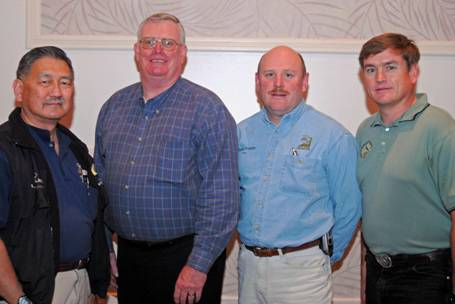|
|||
|
|
Boater Education Remains Top Issue, Safety Experts Hear at San Diego Summit
| ||
Mike Harris HONORED -- Four Southwest boating law administrators were honored at the 12th annual International Boating and Water Safety Summit for their efforts at trying to prevent boating accidents along the Colorado River system. They are, left to right, Ray Tsuneyoshi, director for the California Department of Boating and Waterways; Fred Messmann, Nevada Department of Wildlife boating law administrator; Dave Harris, Utah boating law administrator, and Kevin Bergersen, Arizona boating law administrator. |
Required Boater Education Probable
“The U.S. Coast Guard is getting pretty assertive for some type of national requirement for boater education,” Huntsman said.
The chief of the Coast Guard’s Boating Safety Division was on hand to say such a proposal is pretty close to being finished. Once that happens, and other key federal agencies have had a chance to give their input, it then will go to Congress for review.
“Arizona’s boater education program is voluntary compliance, and about 1,000 persons a year go through the program,” Huntsman said. “The online version started last August, so it’s almost been a year. But, that’s still not a lot of people taking the program.”
Huntsman said that unfortunately most people don’t go through the state’s boater education until they receive a citation and have a judge require the person to take the course.
Kevin Bergersen, Arizona Boating Law administrator, told Arizona Boating & Waterways that getting an annual grasp on the number of persons’ receiving boating citations is somewhat difficult.
“There’s no common reporting base,” he said. “OUI (operating under the influence) arrests seem to be an upward trend, at least on a five-year trend.”
One of the reasons for that upward trend, he said, was that policing agencies are being more effective in training officers how to spot problems on the water.
“The irony is that if you take the class, you can dramatically reduce your chances of a boating accident,” he added.
Four Honored By NWSC
One of the highlights of the summit was honoring four Southwest boating law administrators with the second highest award that the National Water Safety Congress can present.
Huntsman, who also serves as the Region 5 vice president for the Congress, presented the NWSC Boating Safety Award to Ray Tsuneyoshi, director for the California Department of Boating and Waterways; Kevin Bergersen, Arizona boating law administrator; Fred Messmann, Nevada Department of Wildlife boating law administrator, and Dave Harris, Utah boating law administrator.
“The award was given to them to recognize their combined efforts in trying to reduce accidents along the Colorado River system, and to reduce the number of boaters operating under the influence of drugs and alcohol,” Huntsman said.
New Safety Products Showcased
The summit also provided an exhibit area to showcase some of the new boating-safety products now available to boaters.
One of those was a new wireless emergency engine shut -off system available for boaters. Wearing a sensor that sends a signal if it’s submerged, if the boater falls overboard, the control module instantly receives the “boater overboard” signal and shuts off the engine.
Developed by Maritech Industries, the unit works in salt and fresh water.
The company also displayed a system designed for houseboats that provides a two-step control unit to start the engine.
The first step is for the captain to turn on the ignition key, which then sends a signal to the stern of the boat where a designated person checks for any swimmers or debris that might be close by. After checking for persons or obstacles, the person at the stern presses a button that sends an “all clear” signal back to the safety system and which then allows the engine to start.
 May 2008
May 2008